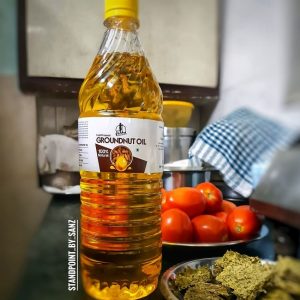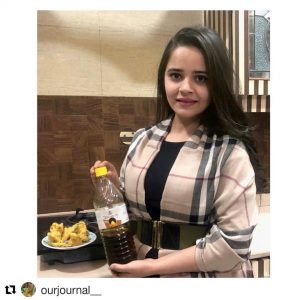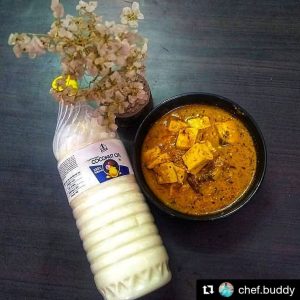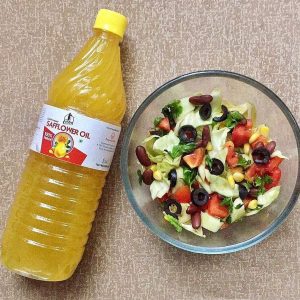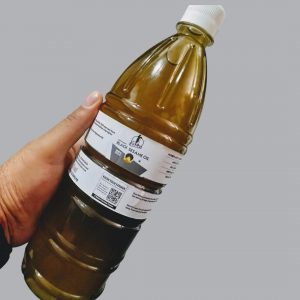Cold Pressed Oils
Groundnut Oil
₹ 420.00 – ₹ 1,990.00What are cold pressed oils?
The oils that you use for cooking everything are extracted from seeds, fruits or vegetables and even nuts. Cold pressing is the method of oil extraction from oilseeds which may include sesame seed, sunflower seeds, canola, coconut or olive without really using heat to extract as that may degrade the oil’s flavour and nutritional quality. Cold pressing method is the process involving crushing seeds or nuts and forcing out the oil through pressure.
In olden times, a long cylindrical contraption known as ‘ghani’ was used to extract oil from oilseeds. Ghani was a mortar and pestle device made of stone or wood that used a perambulating animal to extract oil under pressure from oil-bearing seeds. This was the simplest method for cold pressing oils out of a seed as it didn’t involve the generation of too much heat.
What is available at most stores & supermarkets ?
If you are careful enough you will see different kinds of labels on your oil packaging :
“Losorb”
“Lite”
“Blanched”
“Refined”
What these words really mean is “our oil has gone through tons of chemical processes and is stripped of all it’s natural nutrients!”
What is Oil Refining?
Refining is a process of purification of oils. In this process, oils are robbed of naturally occurring gums, proteins, phospholipids, fine seed particles etc. This makes the oil “light/losorb”. Oils are also neutralized (acidity balanced!), bleached (stripped of color) and deodorized (devoid of it’s natural aroma). And to achieve all these the oil is heated at high temperatures and is treated with chemicals etc.
In a nutshell, modern refined cooking oils provide nothing but pure empty calories (devoid of all nutrients but fats!)
Here’s what Oil Refining looks like :
Why do oil companies sell Refined Oils ?
•Yield
•Shelf Life
•Price
•Modern cooking style of “deep frying”
Why you should move to cold pressed oils :
• Nutritionally Rich: Be it traditional lakdi ghana/kachchi ghani/chekku ennai or commercially prepared extra virgin oils (made using temperature controlled expeller pressing method), cold pressed oils retain most of proteins, vitamins, phosholipids, antioxidants, lecithin etc. And obtaining these essential nutrients from an all natural source is a much wiser and holistic choice than getting them from multivitamin pills.
• Chemical Free: During refining, various chemicals are used like Hexane, Sodium Hydroxide, Sodium Bicarbonate (baking soda), Bleaching Agents etc. And on top of that chemicals like Propyl Gallate, BHA, BHT are introduced as preservatives! Now not all of these are exactly toxic or carcinogenic , but if you are someone who is conscious about living organically and staying away from chemicals, you should consider switching back to cold pressed!
• Forgotten Flavors: Virgin oils, their flavor and aroma, compliments all Indian foods and the spices well. Get those forgotten flavors back into your food.
• Environmental Impact: You lower your carbon foot-print when you are consuming less processed things and saving the environment too.
• Way of Life: Cooking with cold pressed oils has been a tradition not only in India.
Few things to remember :
• Storage:
Cold pressed oils have a limited shelf life (max 6 months). You can always maximize the shelf life by storing it in the cold (think refrigeration) and dark (think non transparent bottles) places, although it is always advisable to use them up as soon as possible to reap their full nutritional benefits.
• Using it up :
Every time you open a bottle of any cold pressed cooking oil – use within 45days.
Sesame oil (white)
₹ 450.00 – ₹ 2,200.00What are cold pressed oils?
The oils that you use for cooking everything are extracted from seeds, fruits or vegetables and even nuts. Cold pressing is the method of oil extraction from oilseeds which may include sesame seed, sunflower seeds, canola, coconut or olive without really using heat to extract as that may degrade the oil’s flavour and nutritional quality. Cold pressing method is the process involving crushing seeds or nuts and forcing out the oil through pressure.
In olden times, a long cylindrical contraption known as ‘ghani’ was used to extract oil from oilseeds. Ghani was a mortar and pestle device made of stone or wood that used a perambulating animal to extract oil under pressure from oil-bearing seeds. This was the simplest method for cold pressing oils out of a seed as it didn’t involve the generation of too much heat.
What is available at most stores & supermarkets ?
If you are careful enough you will see different kinds of labels on your oil packaging :
“Losorb”
“Lite”
“Blanched”
“Refined”
What these words really mean is “our oil has gone through tons of chemical processes and is stripped of all it’s natural nutrients!”
What is Oil Refining?
Refining is a process of purification of oils. In this process, oils are robbed of naturally occurring gums, proteins, phospholipids, fine seed particles etc. This makes the oil “light/losorb”. Oils are also neutralized (acidity balanced!), bleached (stripped of color) and deodorized (devoid of it’s natural aroma). And to achieve all these the oil is heated at high temperatures and is treated with chemicals etc.
In a nutshell, modern refined cooking oils provide nothing but pure empty calories (devoid of all nutrients but fats!)
Here’s what Oil Refining looks like :
Why do oil companies sell Refined Oils ?
•Yield
•Shelf Life
•Price
•Modern cooking style of “deep frying”
Why you should move to cold pressed oils :
• Nutritionally Rich: Be it traditional lakdi ghana/kachchi ghani/chekku ennai or commercially prepared extra virgin oils (made using temperature controlled expeller pressing method), cold pressed oils retain most of proteins, vitamins, phosholipids, antioxidants, lecithin etc. And obtaining these essential nutrients from an all natural source is a much wiser and holistic choice than getting them from multivitamin pills.
• Chemical Free: During refining, various chemicals are used like Hexane, Sodium Hydroxide, Sodium Bicarbonate (baking soda), Bleaching Agents etc. And on top of that chemicals like Propyl Gallate, BHA, BHT are introduced as preservatives! Now not all of these are exactly toxic or carcinogenic , but if you are someone who is conscious about living organically and staying away from chemicals, you should consider switching back to cold pressed!
• Forgotten Flavors: Virgin oils, their flavor and aroma, compliments all Indian foods and the spices well. Get those forgotten flavors back into your food.
• Environmental Impact: You lower your carbon foot-print when you are consuming less processed things and saving the environment too.
• Way of Life: Cooking with cold pressed oils has been a tradition not only in India.
Few things to remember :
• Storage:
Cold pressed oils have a limited shelf life (max 6 months). You can always maximize the shelf life by storing it in the cold (think refrigeration) and dark (think non transparent bottles) places, although it is always advisable to use them up as soon as possible to reap their full nutritional benefits.
• Using it up :
Every time you open a bottle of any cold pressed cooking oil – use within 45days.
Mustard Oil
₹ 375.00 – ₹ 1,800.00What are cold pressed oils?
The oils that you use for cooking everything are extracted from seeds, fruits or vegetables and even nuts. Cold pressing is the method of oil extraction from oilseeds which may include sesame seed, sunflower seeds, canola, coconut or olive without really using heat to extract as that may degrade the oil’s flavour and nutritional quality. Cold pressing method is the process involving crushing seeds or nuts and forcing out the oil through pressure.
In olden times, a long cylindrical contraption known as ‘ghani’ was used to extract oil from oilseeds. Ghani was a mortar and pestle device made of stone or wood that used a perambulating animal to extract oil under pressure from oil-bearing seeds. This was the simplest method for cold pressing oils out of a seed as it didn’t involve the generation of too much heat.
What is available at most stores & supermarkets ?
If you are careful enough you will see different kinds of labels on your oil packaging :
“Losorb”
“Lite”
“Blanched”
“Refined”
What these words really mean is “our oil has gone through tons of chemical processes and is stripped of all it’s natural nutrients!”
What is Oil Refining?
Refining is a process of purification of oils. In this process, oils are robbed of naturally occurring gums, proteins, phospholipids, fine seed particles etc. This makes the oil “light/losorb”. Oils are also neutralized (acidity balanced!), bleached (stripped of color) and deodorized (devoid of it’s natural aroma). And to achieve all these the oil is heated at high temperatures and is treated with chemicals etc.
In a nutshell, modern refined cooking oils provide nothing but pure empty calories (devoid of all nutrients but fats!)
Here’s what Oil Refining looks like :
Why do oil companies sell Refined Oils ?
•Yield
•Shelf Life
•Price
•Modern cooking style of “deep frying”
Why you should move to cold pressed oils :
• Nutritionally Rich: Be it traditional lakdi ghana/kachchi ghani/chekku ennai or commercially prepared extra virgin oils (made using temperature controlled expeller pressing method), cold pressed oils retain most of proteins, vitamins, phosholipids, antioxidants, lecithin etc. And obtaining these essential nutrients from an all natural source is a much wiser and holistic choice than getting them from multivitamin pills.
• Chemical Free: During refining, various chemicals are used like Hexane, Sodium Hydroxide, Sodium Bicarbonate (baking soda), Bleaching Agents etc. And on top of that chemicals like Propyl Gallate, BHA, BHT are introduced as preservatives! Now not all of these are exactly toxic or carcinogenic , but if you are someone who is conscious about living organically and staying away from chemicals, you should consider switching back to cold pressed!
• Forgotten Flavors: Virgin oils, their flavor and aroma, compliments all Indian foods and the spices well. Get those forgotten flavors back into your food.
• Environmental Impact: You lower your carbon foot-print when you are consuming less processed things and saving the environment too.
• Way of Life: Cooking with cold pressed oils has been a tradition not only in India.
Few things to remember :
• Storage:
Cold pressed oils have a limited shelf life (max 6 months). You can always maximize the shelf life by storing it in the cold (think refrigeration) and dark (think non transparent bottles) places, although it is always advisable to use them up as soon as possible to reap their full nutritional benefits.
• Using it up :
Every time you open a bottle of any cold pressed cooking oil – use within 45days.
Coconut Oil
₹ 450.00What are cold pressed oils?
The oils that you use for cooking everything are extracted from seeds, fruits or vegetables and even nuts. Cold pressing is the method of oil extraction from oilseeds which may include sesame seed, sunflower seeds, canola, coconut or olive without really using heat to extract as that may degrade the oil’s flavour and nutritional quality. Cold pressing method is the process involving crushing seeds or nuts and forcing out the oil through pressure.
In olden times, a long cylindrical contraption known as ‘ghani’ was used to extract oil from oilseeds. Ghani was a mortar and pestle device made of stone or wood that used a perambulating animal to extract oil under pressure from oil-bearing seeds. This was the simplest method for cold pressing oils out of a seed as it didn’t involve the generation of too much heat.
What is available at most stores & supermarkets ?
If you are careful enough you will see different kinds of labels on your oil packaging :
“Losorb”
“Lite”
“Blanched”
“Refined”
What these words really mean is “our oil has gone through tons of chemical processes and is stripped of all it’s natural nutrients!”
What is Oil Refining?
Refining is a process of purification of oils. In this process, oils are robbed of naturally occurring gums, proteins, phospholipids, fine seed particles etc. This makes the oil “light/losorb”. Oils are also neutralized (acidity balanced!), bleached (stripped of color) and deodorized (devoid of it’s natural aroma). And to achieve all these the oil is heated at high temperatures and is treated with chemicals etc.
In a nutshell, modern refined cooking oils provide nothing but pure empty calories (devoid of all nutrients but fats!)
Here’s what Oil Refining looks like :
Why do oil companies sell Refined Oils ?
•Yield
•Shelf Life
•Price
•Modern cooking style of “deep frying”
Why you should move to cold pressed oils :
• Nutritionally Rich: Be it traditional lakdi ghana/kachchi ghani/chekku ennai or commercially prepared extra virgin oils (made using temperature controlled expeller pressing method), cold pressed oils retain most of proteins, vitamins, phosholipids, antioxidants, lecithin etc. And obtaining these essential nutrients from an all natural source is a much wiser and holistic choice than getting them from multivitamin pills.
• Chemical Free: During refining, various chemicals are used like Hexane, Sodium Hydroxide, Sodium Bicarbonate (baking soda), Bleaching Agents etc. And on top of that chemicals like Propyl Gallate, BHA, BHT are introduced as preservatives! Now not all of these are exactly toxic or carcinogenic , but if you are someone who is conscious about living organically and staying away from chemicals, you should consider switching back to cold pressed!
• Forgotten Flavors: Virgin oils, their flavor and aroma, compliments all Indian foods and the spices well. Get those forgotten flavors back into your food.
• Environmental Impact: You lower your carbon foot-print when you are consuming less processed things and saving the environment too.
• Way of Life: Cooking with cold pressed oils has been a tradition not only in India.
Few things to remember :
• Storage:
Cold pressed oils have a limited shelf life (max 6 months). You can always maximize the shelf life by storing it in the cold (think refrigeration) and dark (think non transparent bottles) places, although it is always advisable to use them up as soon as possible to reap their full nutritional benefits.
• Using it up :
Every time you open a bottle of any cold pressed cooking oil – use within 45days.
Safflower Oil
₹ 475.00What are cold pressed oils?
The oils that you use for cooking everything are extracted from seeds, fruits or vegetables and even nuts. Cold pressing is the method of oil extraction from oilseeds which may include sesame seed, sunflower seeds, canola, coconut or olive without really using heat to extract as that may degrade the oil’s flavour and nutritional quality. Cold pressing method is the process involving crushing seeds or nuts and forcing out the oil through pressure.
In olden times, a long cylindrical contraption known as ‘ghani’ was used to extract oil from oilseeds. Ghani was a mortar and pestle device made of stone or wood that used a perambulating animal to extract oil under pressure from oil-bearing seeds. This was the simplest method for cold pressing oils out of a seed as it didn’t involve the generation of too much heat.
What is available at most stores & supermarkets ?
If you are careful enough you will see different kinds of labels on your oil packaging :
“Losorb”
“Lite”
“Blanched”
“Refined”
What these words really mean is “our oil has gone through tons of chemical processes and is stripped of all it’s natural nutrients!”
What is Oil Refining?
Refining is a process of purification of oils. In this process, oils are robbed of naturally occurring gums, proteins, phospholipids, fine seed particles etc. This makes the oil “light/losorb”. Oils are also neutralized (acidity balanced!), bleached (stripped of color) and deodorized (devoid of it’s natural aroma). And to achieve all these the oil is heated at high temperatures and is treated with chemicals etc.
In a nutshell, modern refined cooking oils provide nothing but pure empty calories (devoid of all nutrients but fats!)
Here’s what Oil Refining looks like :
Why do oil companies sell Refined Oils ?
•Yield
•Shelf Life
•Price
•Modern cooking style of “deep frying”
Why you should move to cold pressed oils :
• Nutritionally Rich: Be it traditional lakdi ghana/kachchi ghani/chekku ennai or commercially prepared extra virgin oils (made using temperature controlled expeller pressing method), cold pressed oils retain most of proteins, vitamins, phosholipids, antioxidants, lecithin etc. And obtaining these essential nutrients from an all natural source is a much wiser and holistic choice than getting them from multivitamin pills.
• Chemical Free: During refining, various chemicals are used like Hexane, Sodium Hydroxide, Sodium Bicarbonate (baking soda), Bleaching Agents etc. And on top of that chemicals like Propyl Gallate, BHA, BHT are introduced as preservatives! Now not all of these are exactly toxic or carcinogenic , but if you are someone who is conscious about living organically and staying away from chemicals, you should consider switching back to cold pressed!
• Forgotten Flavors: Virgin oils, their flavor and aroma, compliments all Indian foods and the spices well. Get those forgotten flavors back into your food.
• Environmental Impact: You lower your carbon foot-print when you are consuming less processed things and saving the environment too.
• Way of Life: Cooking with cold pressed oils has been a tradition not only in India.
Few things to remember :
• Storage:
Cold pressed oils have a limited shelf life (max 6 months). You can always maximize the shelf life by storing it in the cold (think refrigeration) and dark (think non transparent bottles) places, although it is always advisable to use them up as soon as possible to reap their full nutritional benefits.
• Using it up :
Every time you open a bottle of any cold pressed cooking oil – use within 45days.
Sesame oil (black)
₹ 875.00- may show anti-ageing properties
- may protect liver damage from free radicals
- may help cure constipation and lubricates intestines
- may help in checking high blood pressure as oil is rich in Magnesium
- Calcium and Zinc helps to increase strength of the bones
What are cold pressed oils?
The oils that you use for cooking everything are extracted from seeds, fruits or vegetables and even nuts. Cold pressing is the method of oil extraction from oilseeds which may include sesame seed, sunflower seeds, canola, coconut or olive without really using heat to extract as that may degrade the oil’s flavour and nutritional quality. Cold pressing method is the process involving crushing seeds or nuts and forcing out the oil through pressure.
In olden times, a long cylindrical contraption known as ‘ghani’ was used to extract oil from oilseeds. Ghani was a mortar and pestle device made of stone or wood that used a perambulating animal to extract oil under pressure from oil-bearing seeds. This was the simplest method for cold pressing oils out of a seed as it didn’t involve the generation of too much heat.
What is available at most stores & supermarkets ?
If you are careful enough you will see different kinds of labels on your oil packaging :
“Losorb”
“Lite”
“Blanched”
“Refined”
What these words really mean is “our oil has gone through tons of chemical processes and is stripped of all it’s natural nutrients!”
What is Oil Refining?
Refining is a process of purification of oils. In this process, oils are robbed of naturally occurring gums, proteins, phospholipids, fine seed particles etc. This makes the oil “light/losorb”. Oils are also neutralized (acidity balanced!), bleached (stripped of color) and deodorized (devoid of it’s natural aroma). And to achieve all these the oil is heated at high temperatures and is treated with chemicals etc.
In a nutshell, modern refined cooking oils provide nothing but pure empty calories (devoid of all nutrients but fats!)
Here’s what Oil Refining looks like :
Why do oil companies sell Refined Oils ?
•Yield
•Shelf Life
•Price
•Modern cooking style of “deep frying”
Why you should move to cold pressed oils :
• Nutritionally Rich: Be it traditional lakdi ghana/kachchi ghani/chekku ennai or commercially prepared extra virgin oils (made using temperature controlled expeller pressing method), cold pressed oils retain most of proteins, vitamins, phosholipids, antioxidants, lecithin etc. And obtaining these essential nutrients from an all natural source is a much wiser and holistic choice than getting them from multivitamin pills.
• Chemical Free: During refining, various chemicals are used like Hexane, Sodium Hydroxide, Sodium Bicarbonate (baking soda), Bleaching Agents etc. And on top of that chemicals like Propyl Gallate, BHA, BHT are introduced as preservatives! Now not all of these are exactly toxic or carcinogenic , but if you are someone who is conscious about living organically and staying away from chemicals, you should consider switching back to cold pressed!
• Forgotten Flavors: Virgin oils, their flavor and aroma, compliments all Indian foods and the spices well. Get those forgotten flavors back into your food.
• Environmental Impact: You lower your carbon foot-print when you are consuming less processed things and saving the environment too.
• Way of Life: Cooking with cold pressed oils has been a tradition not only in India.
Few things to remember :
• Storage:
Cold pressed oils have a limited shelf life (max 6 months). You can always maximize the shelf life by storing it in the cold (think refrigeration) and dark (think non transparent bottles) places, although it is always advisable to use them up as soon as possible to reap their full nutritional benefits.
• Using it up :
Every time you open a bottle of any cold pressed cooking oil – use within 45days.
